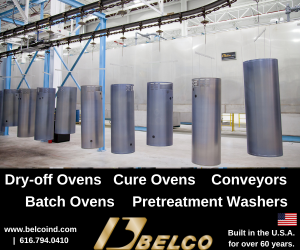energy
Three Steps to Lower Energy Use
Improve paint system bottom line by cutting energy consumption
Read MoreSelective Smut On Sealed Parts
Question: We are producing anodized, electrolytically colored aluminum solar panels.
Read MoreVanadate Conversion Coatings: Alternative to Phosphate?
Emerging pretreatment technology can reduce energy consumption and environmental concerns.
Read MorePaint Line Energy Reductions
What can we do to reduce the amount of energy used in our paint line?
Read MoreSFIC Washington Forum Draws Finishers, Suppliers from Across the Nation
OSHA's proposed chrome PEL, energy costs among the topics on attendees' minds…
Read MoreIn Control
For many plants and job shops, the emergence of process control systems have accounted for hundreds of thousands of dollars in savings in chemical and energy use. Here's a look at one success story...
Read MoreEstimating Finishing Costs
One of the keys to running a successful job shop lies in the ability to accurately assess the costs associated with finishing. Doing so requires that owners and managers examine a variety of factors, including labor, coatings, energy consumption, maintenance and others...
Read MoreThermal Energy Deburring Heats Up
The Thermal Energy Method (TEM) for deburring removes thin metal projections (burrs, flash) from manufactured workpieces by using the energy released when combusting fuel gas and oxygen to burn away the undesirable metal. This technology has been in commercial practice since the late 1960s and while still considered a non-traditional finishing process, it has attained wide acceptance in certain industries…
Read MoreIndustrial Assessments for Pollution Prevention and Energy Efficiency
Is it going to cost your company money to become more environmentally friendly and energy efficient? Some think it will. This executive summary and the associated report show that pollution prevention and energy efficient operations may actually save you money. A link to the full report is provided…
Read MoreAqueous Cleaning Basics
Four factors affect the cleaning process: chemistry; temperature; energy; and time. The various combinations determine how clean your part will be. This article reviews the basics of each type of cleaning to help you determine what will work best for you...
Read More















